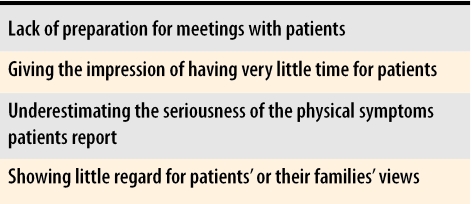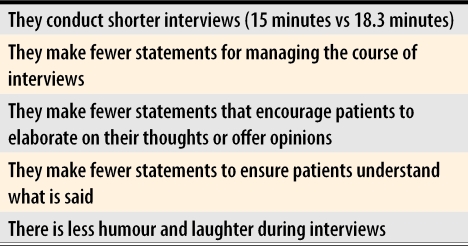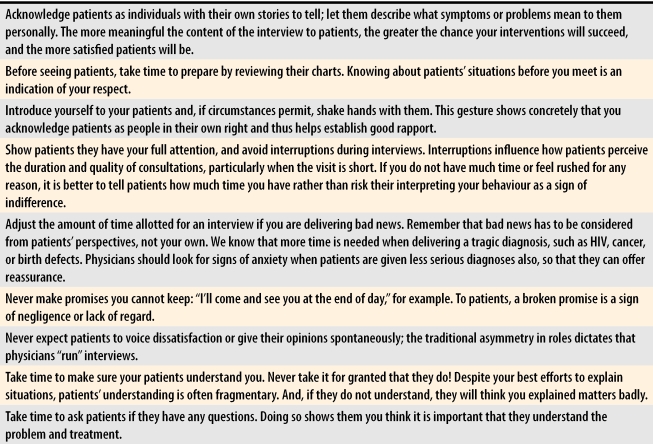What role does doctor-patient communication have in relation to legal actions and complaints? In addition to the “technical” errors complainants claim to have suffered, many also report having faced communication problems.1,2 None of what follows, we should stress, should be taken as an attempt on our part to find ways of preventing patients from taking any recourse to which they are entitled in cases of negligence or error.
We should point out an important distinction between complaints related to the treatment process and complaints where there is evidence of negligence or medical error. A physician’s change in attitude might virtually eliminate complaints regarding the treatment process. Better patient-physician communication could no more than blunt the emotional effect on patients of medical errors.
Main communication problems reported by patients
Studies using various methodologic approaches1-4 have shown that the quality of medical care is not the only thing that determines whether patients take legal action. Relations and communication with physicians—and the dissatisfaction that can result—also have a major role. An estimated 70% to 80% of medical litigation involves relationship or communication problems. The main sources of dissatisfaction are listed in Table 1.
Table 1. Sources of dissatisfaction.
Dissatisfaction arises from poor patient-physician relations and inadequate communication.
Communication and history of malpractice suits
Levinson et al5 were the first researchers to have correlated physicians’ usual communication strategies with their history of malpractice suits. Their study is based on tape recordings they made during physicians’ routine interviews. Table 25 summarizes characteristics that distinguish physicians who have been sued from those who have not.
Table 2.
Characteristics of communication strategies of physicians who have been sued
Adapted from Levinson et al.5
No difference emerged between the two groups in terms of number of informative statements they made. This finding is surprising because, at first glance, it differs from results of studies on communication and satisfaction that show that patients have a stronger desire for information than health care professionals generally estimate.6 The authors were led to conclude that the climate of an interview affects patient satisfaction more than the actual content of the discussion does; for patients, a relaxed atmosphere represents a warmer, more personal relationship.
The findings of Levinson et al5 are particularly persuasive because they are based on direct observation of physicians’ behaviour rather than on patients’ perceptions of what transpired during interviews. Interestingly, the results are generally in line with those of other studies (Table 3).
Table 3.
Lessons drawn from studies of the relationship between malpractice suits and patient-physician communication
Bottom line
Communication strategies that seem to be important are simple and easy to apply in practice.
Concern for efficiency rarely makes up for lack of consideration; excellence in medicine demands a synergy between technical and communication skills.
Good communication is no guarantee against lawsuits or complaints about medical errors. It does, however, play a decisive role in discouraging complaints associated with the treatment process and in increasing patients’ satisfaction with their care.
The articles in the series “Doctor-Patient Communication” have been adapted from articles that appeared originally in the French-language journal L’Omnipraticien. We thank the Department of Professional Education at Aventis Canada for covering the costs of adaptation and translation.
Biography
Dr Lussier is a family physician and Mr Richard is a psychologist, in Montreal, Que.
References
- 1.Beckman H, Markakis K, Suchman A, Frankel R. The doctor-patient relationship and malpractice. Lessons from plaintiff depositions. Arch Intern Med. 1994;154:1365–1370. [PubMed] [Google Scholar]
- 2.Avery JK. Lawyers tell what turns some patients litigious. Med Malpractice Rev. 1985;2:35–37. [Google Scholar]
- 3.Kravitz R, Callahan E, Paterniti D, Antonius D, Dunham M, Lewis E. Prevalence and sources of patients’ unmet expectations for care. Ann Intern Med. 1996;125:730–737. doi: 10.7326/0003-4819-125-9-199611010-00004. [DOI] [PubMed] [Google Scholar]
- 4.Hickson GB, Clayton EW, Entman SS, Miller CS, Githens PB, Whetten-Goldstein K, et al. Obstetricians’ prior malpractice experience and patients’ satisfaction with care. JAMA. 1994;272:1583–1587. [PubMed] [Google Scholar]
- 5.Levinson W, Roter D, Mullooly JP, Dull V, Frankel R. Physician-patient communication. The relationship with malpractice claims among primary care physicians and surgeons. JAMA. 1997;277:553–559. doi: 10.1001/jama.277.7.553. [DOI] [PubMed] [Google Scholar]
- 6.Waitzkin H. Doctor-patient communication. Clinical implications of social scientific research. JAMA. 1984;252:2441–2446. doi: 10.1001/jama.252.17.2441. [DOI] [PubMed] [Google Scholar]





